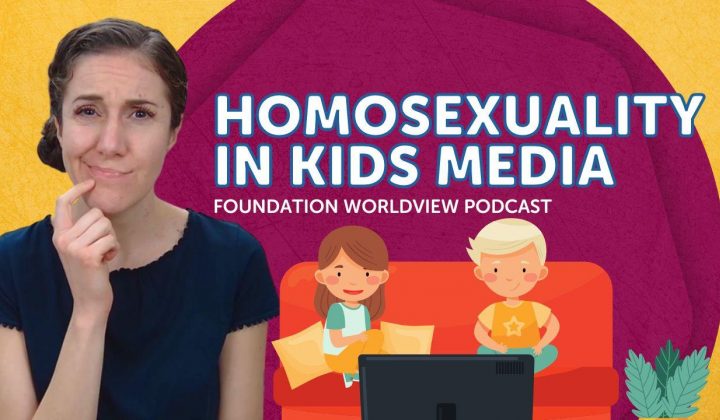Learn more about the journey that led to us equipping kids to carefully evaluate every idea they encounter.
Meet members of our team who have contributed to curriculum development.
Hear from real users of the Foundation Curriculum.
Learn what we believe about God, Jesus, Scripture, and more.
Helping Highly Sensitive Children Navigate Media
Hello, friends! Today's podcast question says: "My son is highly sensitive. He feels very deeply and finds it hard to watch movies and listen to audiobooks or read-alouds without feeling so scared we have to turn it off. They're age appropriate. Is there a way I can sensitize him to these things so we can enjoy them as a family?"
This is a question I can actually relate to for several reasons. As a teacher, I would usually have at least one student every year who struggled with something similar. And even in my own family, two of my nephews struggled with this when they were younger.
I remember one of my nephews—he was probably maybe four or five—and we were going to watch the cartoon version of Robin Hood, the Disney version with the fox. We had to turn it off about three minutes in because in one of the opening scenes, the Sheriff of Nottingham takes away this little bunny's birthday present, and my nephew just started weeping to think that this little bunny had his birthday present taken away from him.
Another nephew of mine—one time we were off to Disney World as a family, and they used to have a little Magical Express bus that would take you from the airport to Disney. There was a cartoon showing on the bus, and he just started yelling, "Too scary! Too scary! Too scary!" I was sitting next to him, so I put my hands over his eyes and said, "Okay, we're going to sing a song." I just covered his eyes and we sang—I think we sang "Come Thou Fount" or something.
I can even relate to this myself because as a child I was very overwhelmed by media. And in all honesty, even to this day, I can really only watch shows or movies that are uplifting because I am a highly empathetic person. While this can be very helpful in certain instances, I lack the ability to separate myself from the characters in a plot line of a story, so I have to be really careful about what I watch.
I was kind of chuckling preparing the notes for this podcast because I was thinking about just a few years ago with the last guy I seriously dated. He was really into movies, and when we started dating, I said, "You have to understand—with how highly empathetic I am, I can't separate myself from movie characters, so there are very few movies that I can handle."
At the beginning of our relationship, he tried to push me a little bit. One time we watched—I mean, it wasn't even that intense—we watched Life of Pi and I said, "I really don't want to watch this. I think I'm going to struggle with it." He said, "You'll be fine. You'll be fine." Well, then we watched it and I couldn't sleep for three nights because I kept thinking about being stranded on a raft with horrible things happening.
All this to say, I can empathize with the questioner because I've had lots of experience working with children who are highly sensitive, including myself.
Reframing Our Goals
Today we're going to look at what we can do when we have a child who is highly sensitive and really struggles with engaging in different forms of media. That's what we're going to dive into on the Foundation Worldview Podcast, where we seek to answer your questions so that you can equip the children that God has placed in your care to carefully evaluate every idea they encounter and understand the truth of the biblical worldview. I'm your host, Elizabeth Urbano, and I'm thrilled that you've joined me for another episode today.
As we're thinking through how to help children who are highly sensitive when engaging in media, the first thing I want to address is this questioner's goal. At the end of the question, it said, "Is there a way that I can sensitize my son to these things so that we can enjoy them as a family?"
I want to gently and lovingly suggest that the goal here should not be to enjoy different forms of entertainment as a family. Now, I understand the desire here. You want to be able to listen to certain books and watch certain movies, and it's natural—especially when we enjoy things—that we want to share that enjoyment with our children.
However, if we're making it a goal to help our children develop an enjoyment of the same things that we enjoy, what that usually does is cut down our relationship with our children. Our children are different than us. God has wired them in a different way. He's given them different personalities and giftings and strengths and weaknesses.
I watched as a teacher—I watched so many parents really try to push to get their kids to enjoy the things that they enjoyed. And in every instance, it really cut down the relationship between the parent and the child.
So I want to propose that the goal in this situation shouldn't be to sensitize our children. It shouldn't be to be able to watch or listen to things as a family. Our goal instead should be to help our children love God and love others through the media that they choose to engage with.
Because if our children are scared of everything—even joyful, upbeat, slower-paced, developmentally appropriate media—they're not loving God because they're not trusting him. Instead of trusting God, they're giving into fear.
And if our children have huge emotional responses anytime media comes on—even media that's joyful and upbeat and slower-paced and developmentally appropriate—they're not loving others because they're not thinking about how they can respond to this media in a way that doesn't bother or hinder or distract others.
Two Key Focus Areas
Understanding what the goals should be—again, the goal should be to help our children love God and love others through the media that they choose to engage with—I think we should focus on two things:
- Helping our children trust God
- Helping our children look out for the needs of others
Helping Children Trust God
When our children have huge emotional responses to things, they're responding to a fear that they are feeling. My recommendation would be to start off helping them trust God by memorizing Scripture. Memorize different verses about who God is and how your child can trust God.
If your child is under the age of eight, I highly recommend that you engage with Scripture that's put to song, because sometimes having a song can really help bring Scripture to mind more quickly.
Here are a few recommendations:
- "When I Am Afraid" by Steve Green from The Hide 'Em In Your Heart Album—this is Psalm 56, verses 3 and 6, put to song
- "Those Who Trust in the Lord" by Scripture Hymnal—this is Psalm 125, verses 1-2, put to song
- "Whatever is True" also by Scripture Hymnal—this is Philippians 4:8 put to song
For the questioner: when your son becomes anxious or feels overwhelmed or nervous when there's an audiobook that he is listening to or when a movie comes on or a show, you can work to recite these verses or to sing these songs together to remind him that God is bigger than this form of media. God is bigger and louder and more present than this audiobook or than this movie or than this show. Just calm his fears by reminding him who God is. This is something you're going to want to come back to again and again and again—that he can trust God.
Helping Children Look Out for the Needs of Others
We want to discuss and practice appropriate responses for when our children are not comfortable with the media that they are presented with.
A lot of times what children do is they might put their hands over their ears and start to scream, or just close their eyes and make a really loud noise so they can't hear anything, or they might just jump up wherever they are and run out of the room because they're scared.
We're going to want to discuss and then practice responses that you can have when you're feeling scared that aren't going to distract or disrupt or disturb others.
What you can do is say, "You know what? If you are feeling scared about a movie or a show or a book, it's okay for you to leave the room. But instead of jumping up and running out in a way that's going to distract others, we can quietly get up and walk out of the room."
Then practice that. Practice sitting on the couch where you might sit when you're listening to an audiobook or watching a show, and practice getting up and slowly and calmly walking out of the room. Or if your child tends to put their hands over their ears and close their eyes and scream, talk about how they can do that in a way that's not distracting and disturbing to others. Practice slowly and quietly putting your hands over your ears or closing your eyes.
Just practice ways of responding that are appropriate and are not going to distract or disturb others.
Practical Strategies
There are really practical strategies we can implement to help our children first trust God in these situations, and second, respond in a way that is loving towards others.
Start with Smaller Screens
Instead of watching a movie or a show on a TV, watch it for the first time on your phone. Now, I am not recommending that you use your phone as an entertainment tool often for your children—in fact, I recommend you do just the opposite and avoid being distracted by your phone or using it as an entertainment tool for your child.
However, during a time when you would normally watch a show or a movie, play that show or that movie on your phone with your child right there. I recommend this because if the screen is smaller, it feels less overwhelming. If you are watching something on a large TV, a lot of times that TV is larger than your child is and it feels very overwhelming. In order to remove himself or herself from this form of entertainment, they actually have to get up and leave the room. But if it's on a phone, your child can easily put their hand over the phone or a pillow or a blanket to cover it up. It's a lot less scary if it's viewed on a smaller screen.
Turn the Volume Down Low
Turn the volume down very low when you're watching, because a lot of times when children are highly sensitive about media, it's because they feel out of control. They feel like it's too loud and it's too much visual stimuli.
In all honesty, this is going to sound somewhat ridiculous, and I know it is, but it's the truth—to this day, I cannot stand going to the movie theater because I'm usually watching a movie that I don't know what it is, so I don't know how I'm going to respond to it with me being highly empathetic. It also feels very overstimulating that the screen is larger than life, and you have no control over what the volume is like.
When I'm watching a new movie, I prefer to watch it at home because I can easily turn it off with one click of the remote. I can also turn the volume way down. When we show something on a smaller screen and we turn the volume down, especially for our kids that are more sensitive to sensory stimulation, it can be really helpful to make them feel like they are more in control and not as anxious.
Similarly, when you're listening to an audiobook, start out by playing the audiobook very quietly. Don't listen to it in the car—listen to it when you're at home, when your child would easily be able to say, "This is scaring me," and they could touch the phone to pause it. Play it very quietly. This is much less overwhelming from a sensory perspective.
Choose Slow and Quiet Media
If your child struggles with any media, even if it's developmentally appropriate, I highly recommend that you start off with media that is very slow and quiet.
If you're thinking about watching a show, even shows that are deemed as developmentally appropriate nowadays have a lot of bright flashes of color and sounds that don't necessarily belong in the show—they're just used to give fast dopamine hits. So watch something that's very slow.
Find episodes of Mr. Rogers. I could be wrong, but I'm fairly certain that in the US there are several seasons of Mr. Rogers that are available for free if you have an Amazon Prime subscription. Find episodes of Mr. Rogers because Mr. Rogers was slow and he was quiet and he would look directly at the camera. Mr. Rogers is a really good place to start off if you have a kid that struggles with shows.
If you're looking for audiobooks, I highly recommend that you get a membership to Focus on the Family's Adventures in Odyssey Club because there are audio dramas on there. If you search according to playlists, they have a playlist that's available for young listeners. Usually those are episodes that are slower-moving. They're not quite as loud, they're not very dramatic, they're pretty upbeat. And again, that's something that you could listen to with the volume turned down.
For certain shows, if you're watching on YouTube, you could even slow down the speed of the show so that again, it's less overwhelming.
Progressive Exposure
Once you've made it through a show or a movie on your phone with the volume low, the next time that you're going to watch something, watch the same exact episode or the same movie on a TV, still with the volume low. Because if you watch the same thing, your child has already made it all the way through, so there are no surprises. There's nothing that's going to pop out of nowhere that your child wasn't expecting.
So move from your phone to the TV with the volume on really low. Then the next time, watch that same thing again, but turn the volume from low to a normal volume. Watching something again takes away the element of surprise and the fear of being out of control.
Those are just some practical suggestions for children who are more sensitive and struggle with media. Just as a reminder, the goal in this is we want to help our children love God and love others through the media that they choose to engage with.
Take the Next Step
Well, that's a wrap for this episode. As parents raising highly sensitive children, we need ongoing support and biblically-grounded resources to help our kids navigate this media-saturated world with wisdom and courage.
If you found this episode helpful and want to stay equipped with practical strategies for raising kids who love God and love others, I'd love to have you join our email community. Sign up at foundationworldview.com/podcast to receive regular encouragement and biblically-based parenting insights delivered straight to your inbox. Don't miss out on future episodes and resources designed specifically for Christian parents who want to raise children with a strong biblical worldview.
And if you're looking for comprehensive curriculum that helps children think biblically about every area of life, check out Foundation Worldview's complete curriculum offerings at foundationworldview.com. Our materials are designed to help you intentionally disciple the children God has placed in your care, giving them the tools they need to evaluate every idea they encounter through the lens of Scripture.
If you have a question that you would like for me to answer on a future Foundation Worldview podcast, you can submit that question by going to foundationworldview.com/podcast.
As we leave our time together, my prayer for you is that no matter the situation in which you and the children God has placed in your care find yourselves, that you would trust that God is working all things together for your good by using all things to conform you more into the image of His Son. I'll see you next time.
Related Posts and insights

Homosexuality in Kids Media
In this episode of the Foundation Worldview podcast, host Elizabeth Urbanowicz addresses a parent's question about responding to same-sex marriage portrayed in a children's show. Listen in as she provides guidance on discussing feelings, desires, and the concept of truth with children, while encouraging them to evaluate ideas against the biblical worldview. Join us as we help you navigate these complex issues with your children.

Lilo & Stitch: A Biblical Worldview Movie Review for Families
Explore 3 biblical conversations to have with your kids after watching Lilo and Stitch, helping them understand sin, family, and true love through Scripture.

Witchcraft, Magic, and Sorcery in Media
Today's question says, "should I let my children watch shows and movies with magic, witches and sorcerers when the Bible says to avoid these things?"



